GI Bill, a game-changer for veterans, turns 70
On Sunday, the nation will mark the 70th anniversary of the Servicemen's Readjustment Act of 1944, more commonly known as the GI Bill.
The bill has been credited with providing millions of military veterans with college educations and creating the American middle class.
Nathaniel Boone, 86, credits the bill with changing his life, forever.
In 1946, he was one of the first African-Americans to integrate the Marines.
He joined with one goal in mind - to use the GI Bill to get to college.
"My father had died in 1942, and my mother was sick with tuberculosis, and they didn't have the money to send me to college," Boone said. "I heard that there was a GI Bill and if I served two years that would give me four years of college."
But joining the Marines would be not be without its challenges for the then-18-year-old New Jersey native.
He would have to travel south by bus to Camp Lejeune, North Carolina, during a time where segregation was still a reality.
"I had to sit in the back of the bus," Boone said of the trip down to the base.
The bus trip was only the beginning for Boone in his quest for a college education. There was Montford Point.
"Montford Point was a little section of Camp Lejeune, North Carolina, and it was constructed to accommodate the black Marines, and it was a swamp," Boone said.
But the officers in charge proved to be a bigger challenge.
"It was the white officers and the white enlisted men who didn't want us," Boone said.
He said he was treated decently because he "had no contact with them."
"But there were others who - a little before me - who served. They told me a story of one of the officers would come out in the morning and immediately ask, 'How are my (N-word) doing today?'"
But Boone would not be deterred.
He finished his basic training, served two years as a radar specialist and matriculated to Bates College in Lewiston, Maine, in 1948.
"I don't know what I would have done if the GI Bill had not been there. It established a middle class of people in the United States. Because in those days, you were either rich or you were poor," he said.
Curtis Coy, deputy undersecretary at the Department of Veterans Affairs, is in charge of administering today's GI Bill.
Coy said the original legislation - which educated eight million World War II veterans - was indeed a game-changer for men like Boone.
"Many of the veterans that used the GI bill after World War II, they were the first of their families to had ever gone to college," Coy said.
Coy said the original GI Bill provided $500 a year in tuition and about $50 a month in living expenses.
"Back in 1944, a gallon of milk was about 21 cents, a loaf of bread was about 9 cents. So those living expenses were quite significant to the veteran back then," Coy said.
Boone's life changed when he went to Bates.
He met his wife, Harriet, there, and they've been married for 56 years.
Boone went on to law school at Boston University, working various jobs at the post office and scrubbing floors in restaurants to make it through.
"I wanted to become a lawyer. I wanted to become a professional person," he said.
Boone embarked on a 50-year legal career, and he and Harriet raised two professionals of their own. Their son, Peter, is an orthopedic surgeon, and daughter Daryl is a head librarian at Harvard.
The Boones retired in Manchester, Vermont, and now boast three Ivy League-educated grandsons.
"I've been very, very, very lucky. Yes, our kids have done very well, and I'm very, very proud of them," said Boone. "I attribute everything which I've done and what I am today to the GI Bill of Rights."
In 2012, the United States government finally honored the Montford Point Marines for their service.
Boone was one of about 200 surviving veterans to receive the Congressional Gold Medal in the nation's capital.
"But for the Marine Corps I would not have gone to college. There would be no college, there would be no Harriet, there wouldn't be the life that I lived," he said.
More than 20 million veterans have received their college educations since the original GI Bill in 1944 at a cost of $120 billion.
Today's post-9/11 bill pays for just under $20,000 in annual tuition and an average housing allowance of $1,500 a month.
